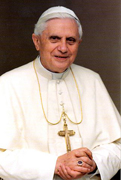 Vatican City, Jul 27, 2009 / 10:53 am (CNA).- Pope Benedict XVI spoke about the greatness of God’s mercy and forgiveness at the Cathedral of Aosta, Italy, where he celebrated Vespers Friday afternoon.
Vatican City, Jul 27, 2009 / 10:53 am (CNA).- Pope Benedict XVI spoke about the greatness of God’s mercy and forgiveness at the Cathedral of Aosta, Italy, where he celebrated Vespers Friday afternoon.
The Pope spoke to a crowd of 400 priests, religious, and lay faithful about the importance of keeping God at the center of one’s life. In his homily, delivered without notes, he explained that if “our relationship with God is not living, if it is not lived, then none of our other relationships can take their correct form.”
He went on to say that this is true for society as well as individuals. If we try to “do without God, if God is absent, we lack the compass … to show us the path, the direction we must follow,” he said.
“We must bring the truth of God back into the world, make Him known,” the Holy Father said. “Evangelization consists precisely in the distant God becoming close, in God no longer being far off but near, in this ‘known-unknown’ finally making Himself known and revealing His face.”
Benedict continued to say that “God’s omnipotence is not an arbitrary power, because God is Good, He is Truth. Hence God can do everything but He cannot act against goodness, He cannot act against truth, He cannot act against love and freedom, because He Himself is goodness, love and true freedom.”
“God is the custodian of our freedom, of love and of truth. This eye that looks down is not an evil eye watching over us, but the presence of a love that never abandons us,” the Pope explained.
The Holy Father also emphasized that “the pinnacle of God’s power is mercy and forgiveness.” He contrasted this idea with the modern notion of political, economic or military power, recalling Stalin’s question, “How many divisions does the Pope have?” as being the typical modern understanding of power.
But God’s true power is “the power of grace and mercy,” the Pope said. “God has suffered and in the Son suffers with us,” he explained. “Thus He shows true divine power. He wanted to suffer with us and for us. We are never abandoned in our sufferings.”
This suffering was necessary to save the world, Benedict continued, “because in the world there exists an ocean of evil, of injustice, of hatred and of violence, and the many victims of hatred and injustice have the right to see justice done.”
Therefore, “God must enter into this world and oppose the ocean of injustice with a greater ocean of goodness and love,” he concluded.
